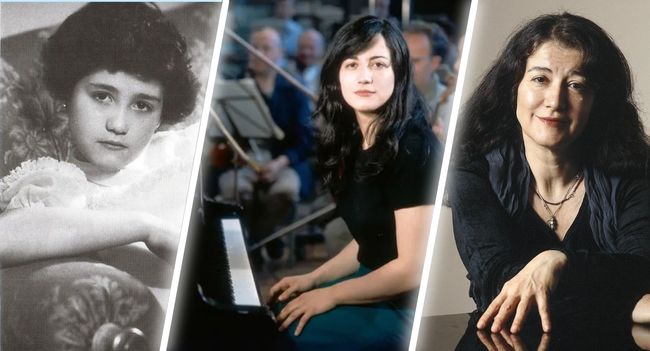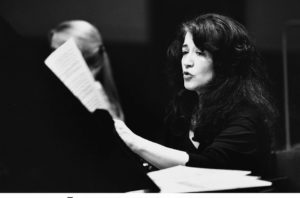~ Martha Argerich, legendary Argentine concert pianist
~~~~~~~~O~~~~~~~
She is the only concert pianist capable of setting her own conditions with the most powerful music recording companies and concert halls in the world.
She is temperamental, unpredictable and cancellation of her concerts are equally possible as they are unforeseeable. Her technique is widely considered the most formidable of her generation. Her sense of style fuels imaginative performances of great piano concertos as varied as Chopin to those of Prokofiev and Bartok. Her originality gives the harshest of critics no choice but to draw comparison with Horowitz, Rubinstein and Richter.
She appears fragile at heart, fearing solitude and death. Yet, she is widely recognized to be one of the greatest concert pianists of the second half of the twentieth century.
She is
Martha Argerich

Martha Argerich during the Prokofiev Sessions with the late Claudio Abbado, Berlin in 1967 (Photo credit: DG/Ilse Buhs)
Early Life
Martha Argerich was born on 5 June 1941 in Buenos Aires where her maternal grandparents were Jewish immigrants from Russia. She was a gifted child and began playing the piano at the age of three when her mother enrolled her at a kindergarten where other children were a few years older.

Martha Argerich at Pier 86, New York city in 1962 after having arrived on the liner Constitution (Photo credit: Dick DeMarsico)
One of her classmates, an older boy around five years old would tease her and once told her she could not play the piano.
Immediately, she stood up, went to the piano and began playing by ear a tune the teacher has always been playing.
Recognizing her daughter’s talent, Argerich’s mother began enrolling her child for private lessons at the age of five with renown Italian instructor Vincenzo Scaramuzza.
By the age of eight, Argerich made her professional debut concert by playing Mozart’s D minor and Beethoven’s C major piano concertos.
The President and a little girl
Argerich recalls the time when she was twelve years old and played at the Colón. So good was her performance, she received an appointment at the presidential residence. Her mother asked if she could accompany her daughter for the appointment with the President and they of course agreed.
The President of Argentina Juan Perón received them and asked the little girl, “And where do you want to go, natita*?”

Little Martha Argerich
To which she replied, “I want to go to Vienna ….. to study with Gulda”.
It seemed to have pleased the President the little girl did not want to go to the USA. Her mother was trying to warm to the President, telling him her daughter will be so thrilled to play at the secondary school union.
But the little girl must have made a face that she was not keen on the idea.
The President picked up on it and allowed her mother to ramble on, telling her ‘of course they can organise the concert, señora’, while winking to the little girl and gesturing ‘no’ with his finger under the table. The little girl was amused that the President was teasing her mother whilst appeasing her wish to study in Europe.
The President eventually appointed Argerich’s parents to diplomatic posts in Vienna and in 1955, the Argerich family moved to Europe, enabling Martha to study with Austrian pianist and composer Friedrich Gulda whom she would later regard to be one of her most important influences.
* natita: A term of endearment meaning “little nose”
Worldwide acclaim

Martha Argerich – The Legendary 1965 Recording
Argerich’s skill and technique improved tremendously under the guidance and tutelage of Gulda.
By 1957 in a span of three weeks, the sixteen year-old Argerich won two highly respected piano competitions – the Geneva International Music Competition and the Ferruccio Busoni International Piano Competition in Bolzano, Italy.
The breakthrough came in Warsaw, Poland when Martha Argerich became the first woman to win the most prestigious International Chopin Piano Competition in 1965.
She won the hearts of the Polish who sang ‘Sto lat’ to wish her well, a gesture hitherto only given to Artur Rubinstein.
The whole world was now at her feet after her tumultuous victory in Warsaw that thrust her into international stardom. Recording contracts began pouring in and she was sought after by the great orchestras of Europe and North America. And still, she was only 24 years young.
Personal life
Martha Argerich has been married twice and has three daughters from three different relationships. At 22, she married Taiwan-born violinist, composer and conductor Robert Chen and had her first child Lyda Chen-Argerich, who is a violinist.
Subsequently, Argerich was married to Swiss conductor Charles Dutoit between 1969 and 1973 with whom she has a daughter, Annie Dutoit.
Argerich also had a relationship with American concert pianist and conductor Stephen Kovacevich (previously Stephen Bishop) with whom she has a daughter Stéphanie Argerich.
She continues to record and perform with Dutoit as conductor of the some of the great orchestras in Europe and North America. A performance of Tchaikovsky’s Piano Concerto No. 1 in B flat minor Op.23 in 1975 is among one of so many works the duo collaborated together.
Tchaikovsky’s Piano Concerto No. 1 in B flat minor Op. 23
Conductor: Charles Dutoit, Soloist: Martha Argerich, piano.
Orchestre de la Suisse Romande, Geneva Switzerland 1975.
(Listening guide: Use a good set of headphones)

Martha Argerich (circa 1965)
Perhaps the richness and colour of Argerich’s sound comes from her connection and intimacy with so many different cultures.
She was born in South America, moved to Europe at a young age and her lovers were all from different backgrounds. She lives in Brussels and is fluent in French, English, Spanish, Italian and German.
Despite her huge repertoire of concert works, Argerich brings a different perspective to each interpretation that fascinates and intrigues. But she never quite felt the deep connection with the audience that other performers enjoyed.
By 1980, she began scalling down her commitment for solo performances because she felt “lonely” on stage, preferring to play chamber music with other musicians who provided a cushion for her solitude.

Martha Argerich (circa 1965)
And despite being so respected and celebrated around the world, she felt loneliness with the business of being a concert pianist – the constant travelling to foreign cities and being alone in hotels. Quite ironically, she despairs it’s a life that prevents her from being where and with whom she wants to be.
In 1990, Argerich was diagnosed with malignant melanoma and after treatment, the disease went into remission but resurfaced in 1995, eventually metastasizing to her lungs and lymph notes.
Upon aggressive treatment which included the removal of part of her lung and the use of an experimental vaccine at John Wayne Cancer Institute, her cancer went into remission again. In gratitude, Argerich gave a recital at Carnegie Hall to benefit the Institute. As of 2014, she remains cancer-free.
An intimate account of her life was made into a documentary, Bloody Daughter directed by her daughter Stéphanie Argerich premiered at the 7th Rome Film Festival on 15 November 2012.
The Bloody Daughter – A documentary of Martha Argerich,
by Stéphanie Argerich

Martha Argerich, Stephen Kovacevich, Stéphanie Argerich and Lyda Chen at the premiere of ‘Bloody Daughter’, The 7th Rome Film Festival, Auditorium Parco Della Musica on November 15, 2012 in Rome, Italy. (Photo by Ernesto Ruscio / WireImage)
Stéphanie Argerich tells of her mother:
“Sometimes I wonder, what if I haven’t spent my whole life following my mother, struggling against the hold she has on me, so soft, and yet so paralysing.

Stéphanie Argerich
Whenever I manage to escape from her, she caught up with me. I felt that she was everywhere, all the time.”
The documentary is about the life of the great pianist Martha Argerich and her interaction with her family. Stéphanie Argerich gives us a glimpse into the relationship between her parents:
“It’s very rare to see my parents sitting side by side. When I look at them, I can imagine that they have spent their whole lives together. I think they even look alike.
My mother always told me that my father was the love of her life. And that she fell for him when she heard him play Beethoven’s fourth piano concerto.”
The film also provides an account of Argerich’s work to help young musicians all over the world to embrace music in their daily lives.

Martha Argerich with young Stéphanie
The aim of the Argerich Arts Foundation in Japan is to keep a distinction between commercialism and use music to promote spiritual awareness of a society.
Through music, we can nurture children to build the future and create a new social environment to support and celebrate humanity.
Excerpts from Bloody Daughter, a documentary of Martha Argerich
(Listening guide: Use a good set of headphones)
The enigma of Argerich’s life is mysterious and fascinating. Perhaps it is a trait of some of the most prodigious of talents in music that our world has ever seen.

Martha Argerich (in 2009)
Should we attempt to analyze and understand the puzzling enigma behind the persona?
It may be easier to just rejoice and celebrate their extraordinary world, without which, ours would surely be less colourful.

 A formidable, legendary pianist, there is an air of mystery surrounding Martha Argerich, in part due to her reluctance to give interviews and the rarity of her concert appearances (her concert sell out in minutes). She has never sought to cultivate the image of the superstar virtuoso. A prodigious, ferocious talent, Argerich is blessed with a photographic memory, enabling her to reproduce music after a single hearing. Her bravura technique is beyond comparison: she has a “thing for octaves” and can make the rapid octave passages in Tchaikovsky’s first piano concerto or Schumann’s Toccata, one of the most challenging works in the entire repertoire, look like child’s play. Behind that technical assuredness, is an artistry which makes you feel as if you are hearing familiar, well-known repertoire anew. That’s a remarkable skill in any pianist, but for someone in their late-70s who’s been performing for over half a century, it’s extraordinary.
A formidable, legendary pianist, there is an air of mystery surrounding Martha Argerich, in part due to her reluctance to give interviews and the rarity of her concert appearances (her concert sell out in minutes). She has never sought to cultivate the image of the superstar virtuoso. A prodigious, ferocious talent, Argerich is blessed with a photographic memory, enabling her to reproduce music after a single hearing. Her bravura technique is beyond comparison: she has a “thing for octaves” and can make the rapid octave passages in Tchaikovsky’s first piano concerto or Schumann’s Toccata, one of the most challenging works in the entire repertoire, look like child’s play. Behind that technical assuredness, is an artistry which makes you feel as if you are hearing familiar, well-known repertoire anew. That’s a remarkable skill in any pianist, but for someone in their late-70s who’s been performing for over half a century, it’s extraordinary.